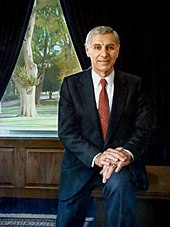George Deukmejian
Courken George Deukmejian Jr. (born June 6, 1928 in Menands , Albany County , New York - † May 8, 2018 in Long Beach , California ) was an American lawyer and politician with the Republican Party . From 1983 to 1991 he was the 35th governor of the state of California.
Earlier years and political advancement
Deukmejian was in Menands, New York, the son of immigrants from Turkey with Armenian born descent. He earned a BA in Sociology from Siena College in 1949 . In 1952 he earned a Juris Doctor (JD) from St. John's University . After graduating, he worked for the Judge Advocate General's Corps (JAGC), the highest judicial authority in the US armed forces.
In 1955 he moved to Long Beach , California. He married Gloria Saatjian in 1958, with whom he has three children: two daughters, born in 1965 and 1970, and a son born in 1967. In 1962 Deukmejian was elected to the California State Assembly , his constituency was in Long Beach. Four years later he was elected to the California Senate. From 1969 he led the Republican parliamentary group as Senate Majority Leader . In 1970 he unsuccessfully applied for the office of Attorney General of California ( Attorney General ). Eight years later he was elected to this position and served from 1979 to 1983.
Governor of California
In 1982 Deukmejian won the primaries against incumbent Republican Lieutenant Governor Mike Curb and later also the actual election on November 2, 1982 against the Mayor of Los Angeles , Tom Bradley . With 49 versus 48 percent of the votes cast, his victory as the successor to the no longer candidate Jerry Brown was extremely narrow. Since surveys at times saw his opponents at an advantage, Bradley's narrow defeat was also described as the Bradley Effect due to his Afro-American identity . On January 3, 1983, Deukmejian was sworn in as the 35th Governor of California . Due to the democratic majority in the State Legislature, Deukmejian had to try to win political opponents for his cause throughout his term as governor. In November 1986, however, he managed a clear election victory with over 60 percent of the vote. He defeated Tom Bradley again. A key issue in his governor's policy was the problem of crime. He countered this with a strict “ law-and-order ” policy. At the beginning of his tenure in 1983 there were 34,640 people in custody in California; in 1991 the number was 97,309. Deukmejian took rather moderate positions on other socio-political issues. He spoke out in favor of the right to an abortion (" Pro-Choice "), which does not correspond to the majority opinion within his party.
For the presidential election in 1988 he was on the list of possible vice-presidents for the Republican presidential candidate George Bush , who ultimately chose Dan Quayle . For the gubernatorial election in 1990 he did not run again and was replaced in January 1991 by the Republican Pete Wilson . He was the last California governor to voluntarily renounce a third term because a referendum in 1990 introduced a legal limit to two terms. However, his predecessor Jerry Brown was re-elected governor in 2010 and thus for a third term. Brown, who was re-elected in 2014, was not affected by the new legal situation, as the referendum will only apply to terms of office after 1990.
After the governorship
Deukmejian worked for a law firm in Los Angeles from 1991. In 2000 he gave up his profession and then worked on several commissions. He died on May 8, 2018, a month before his 90th birthday.
Individual evidence
- ^ Katie Hafner: George Deukmejian, 2-Term California Governor in the '80s, Dies at 89. In: The New York Times . The New York Times Company , May 8, 2018, accessed May 10, 2018 .
Web links
- George Deukmejian in the National Governors Association (English)
- George Deukmejian in nndb (English)
| personal data | |
|---|---|
| SURNAME | Deukmejian, George |
| ALTERNATIVE NAMES | Deukmejian, Courken George junior (full name) |
| BRIEF DESCRIPTION | American lawyer and politician (Republican Party) |
| DATE OF BIRTH | June 6, 1928 |
| PLACE OF BIRTH | Menands , New York |
| DATE OF DEATH | May 8, 2018 |
| Place of death | Long Beach , California |



